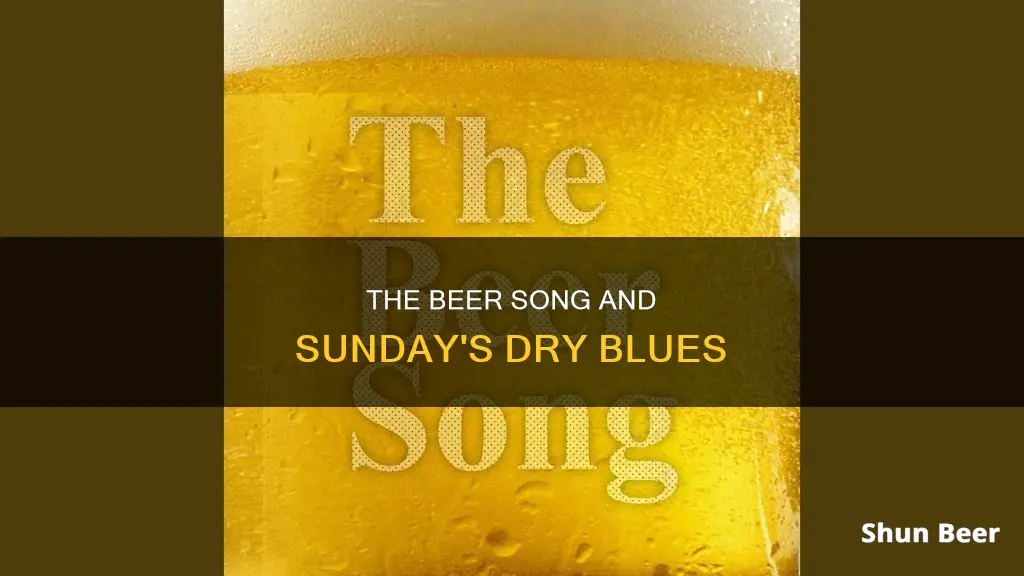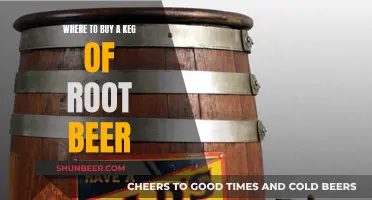
Drinkin' Beer on a Sunday by Bowling for Soup is a song that touches on the theme of finding solace in drinking alcohol, particularly on a Sunday, which is often associated with religious observance and restricted activities in some places. The song's lyrics reflect on life's challenges and the temptation to escape them through drinking, a theme also explored in Johnny Cash's Sunday Morning Coming Down. These songs resonate with listeners who relate to the loneliness and desire to numb emotional pain with alcohol. While drinking laws vary across regions, blue laws in some parts of the world continue to restrict alcohol sales on Sundays, impacting social and shopping habits.
| Characteristics | Values |
|---|---|
| Song Title | Drinkin' Beer On a Sunday |
| Artist | Bowling for Soup |
| Album | Drunk Dynasty |
| Year of Release | 2016 |
| Genre | Rock |
| Lyrics | "La la la, na na na na na" Wash your troubles away/Singing, "La la la, na na na na na" Just think about drinking beer on a Sunday |
| Theme | Alcohol, Depression, Loneliness |
What You'll Learn

The history of 'blue laws'
Blue laws, also known as Sunday laws, Sunday trade laws, or Sunday closing laws, are laws that restrict or ban certain activities on specified days, usually Sundays in the Western world. The laws were originally adopted for religious reasons, specifically to promote the observance of the Christian day of worship. However, they have since come to serve secular purposes as well.
The term "blue law" commonly refers to the prohibition of alcohol sales on Sundays. Historically, it defined a set of regulations designed to preserve the Sabbath by prohibiting most labour on that day. Some such restrictions date back to the 13th century in England.
Colonial settlements in North America enacted similar laws with the explicit religious intent to prevent unseemly activities on the Sabbath. Early blue laws in New England were extensive, including bans on everything from wearing lacy shirtsleeves to hunting and using birth control.
After independence, many former colonies retained these laws, and new states adopted them as they joined the union. While most blue law provisions relating to everyday activities had disappeared by the end of the colonial period, restrictions on alcohol consumption and preserving Sunday as a day of rest remained.
The first known example of the phrase "blue laws" in print was in the March 3, 1755 edition of the New-York Mercury. In his 1781 book, "General History of Connecticut", Reverend Samuel Peters used the phrase to describe numerous laws adopted by 17th-century Puritans that prohibited various activities on Sundays, both recreational and commercial.
While the origin of the term "blue laws" remains a mystery, one plausible explanation suggests that the laws were aimed at enforcing morality and were thus considered "blue-nosed". Another theory suggests that the term "blue" may have been used as a synonym for Puritanism, referring to its overly strict nature.
Blue laws commonly ban certain business and recreational activities on Sundays and impose restrictions on the retail sale of hard goods and consumables, particularly alcohol. The laws also place limitations on a range of other activities, including travel, fashion, hunting, professional sports, stage performances, movie showings, and gambling.
In the United States, while the Supreme Court has upheld blue laws as constitutional, recognising their religious origins, various state courts have struck them down as unenforceable or in violation of state constitutions. Despite this, many states continue to ban the sale of alcohol on Sundays, with 28 states having some form of alcohol sales restrictions in place as of 2022.
Buying Beer in Texas: Sunday Shopping Laws Explained
You may want to see also

The impact of Christianity on blue laws
The song "Can't Buy Beer on Sunday" by K.C. Douglas laments the singer's inability to purchase alcohol on a Sunday, a restriction that was once common in many parts of the United States and still exists, to varying degrees, today. These so-called "blue laws" have a long history and are deeply intertwined with the influence of Christianity on American culture and legislation.
Blue laws are a type of legislation that restricts certain activities on Sundays, the Christian Sabbath, or other religious holidays. The term "blue law" itself is believed to originate from a reference to the Ten Commandments, which were traditionally engraved on stone tablets and thus referred to as "blue laws." The impact of Christianity on these laws is evident in their focus on regulating behavior in accordance with religious teachings. In the context of the song, the restriction on buying beer on Sundays reflects a Christian influence on legislation aimed at promoting sobriety and restricting activities considered sinful or immoral.
The specific impact of Christianity on blue laws can be seen in the historical context of their enactment and enforcement. Many blue laws were established in colonial America, when various Christian denominations, particularly Puritans and Calvinists, held significant influence over the legal and social landscape. These religious groups advocated for strict observance of the Sabbath, which included abstaining from work and recreational activities, including the consumption of alcohol. As a result, selling or purchasing alcohol on Sundays was prohibited in many colonies, and these restrictions carried over into the early laws of the United States.
The influence of Christianity on blue laws extended beyond the restriction of alcohol sales. Other common blue law provisions included bans on public entertainment, sporting events, and certain types of travel on Sundays. In some cases, even activities like dancing, playing cards, or participating in leisure activities that could be considered a distraction from religious observance were prohibited. These laws reflected a Christian understanding of the Sabbath as a day of rest and worship, and their enforcement was intended to ensure that individuals prioritized religious duties over secular pursuits.
Buying Beer in Lumberton, Texas: What You Need to Know
You may want to see also

The variation in blue laws across different states
Blue laws, also known as Sunday laws, are laws that restrict or ban some or all activities on specified days, usually Sundays. The laws were originally adopted for religious reasons, specifically to promote the observance of the Christian day of worship. However, they have since come to serve secular purposes as well, such as providing a day of rest for workers. While blue laws may seem unconstitutional due to their religious origins, the U.S. Supreme Court has ruled them constitutional, citing secular justifications such as protecting workers and families, and guaranteeing the free exercise of religion.
The specific blue laws vary across different states in the U.S. For example, in Arkansas, 39 out of its 75 counties are "dry", meaning the sale of any alcoholic beverage is prohibited entirely. On the other hand, states like Arizona have repealed their laws restricting alcohol sales on Sundays. Arizona previously limited alcohol sales hours on Sundays from 2 a.m. to 10 a.m., but this law was repealed in 2010.
In addition to alcohol sales, blue laws may also restrict other activities such as hunting and car sales. For instance, Maine prohibits hunting on Sundays, while Illinois bans horse racing on Sundays unless authorized by the local municipality. Car dealerships are also closed on Sundays in several states, including Illinois, Indiana, and Oklahoma.
Where to Find 8th Wonder Beer in the UK
You may want to see also

The repeal of blue laws
Blue laws, also known as Sunday laws, are laws that restrict or ban some or all activities on specified days, most often Sundays. The laws were originally adopted for religious reasons, specifically to promote the observance of the Christian day of worship. However, they have since come to serve secular purposes as well, such as providing a day of rest for workers and their families. While blue laws have been repealed in most parts of the United States, many states continue to impose tighter restrictions on the sale of alcoholic drinks on Sundays.
The term "blue laws" was first used in print in 1755, but its exact origin remains a mystery. One popular theory suggests that early blue laws in Connecticut were printed on blue paper, but no copies supporting this claim have been found. Another explanation is that the laws were called "blue" because they were aimed at enforcing morality and were thus considered "blue-nosed".
Blue laws have a long history in the United States, dating back to the 17th century when the Jamestown Colony enacted the first blue law in 1619. The laws were particularly prevalent in Puritan New England, where they were directed almost solely towards behaviour on the Sabbath. Over time, blue laws were enacted at the local and state levels across the country, with most intended to protect Sunday as a day of rest and religious worship.
In recent years, there has been a push to repeal blue laws, with more states rolling back restrictions. For example, in 2018, Tennessee allowed stores to sell wine on Sundays, recognising that Sunday was "the biggest shopping day of the week". However, as of 2019, 28 states still had some form of blue laws on the books.
The impact of blue laws has been studied, with some research suggesting that the repeal of blue laws led to decreased church attendance, decreased donations to churches, and increased alcohol and drug use among religious individuals.
Buying Beer in Jackson Parish: Sunday Shopping Laws
You may want to see also

The public perception of blue laws
Blue laws, also known as Sunday laws, are laws that restrict or ban some or all activities on specified days, most often Sundays. These laws were originally adopted for religious reasons, specifically to promote the observance of the Christian day of worship. However, they have since come to serve secular purposes as well, such as providing a day of rest for workers and their families, contributing to societal stability, and guaranteeing the free exercise of religion. While blue laws have been repealed in most parts of the United States, many states continue to impose tighter restrictions on the sale of alcoholic beverages on Sundays.
Public perception of blue laws varies depending on cultural, religious, and geographical contexts. In the United States, blue laws have been a source of contention, with some people arguing that they are unnecessary and restrictive, while others view them as necessary for maintaining law and order, and upholding religious values. For example, in the Deep South, some people express frustration about not being able to purchase beer before 12 pm on Sundays, attributing it to Christians not wanting anyone to start drinking before they get out of church. On the other hand, there are also individuals who comply with these laws without questioning their purpose.
In small and rural communities, blue laws are often enforced more strictly, and they are generally supported by religious groups and labour unions. These laws are seen as a way to uphold religious values and protect the Sabbath as a day of rest. However, there is also criticism of blue laws, particularly from those who observe the Saturday Sabbath, such as Jews and Seventh-day Adventists, as they are forced to comply with mandated closures on Sundays in addition to their Sabbath on Saturdays.
In recent years, there has been a gradual shift towards relaxing blue laws, with more states rolling back restrictions. This change is driven by the recognition that consumer habits have evolved, and Sunday has become the biggest shopping day of the week. Additionally, some states, such as Tennessee and Texas, are working towards loosening their blue laws related to alcohol sales. However, until these laws are officially repealed, individuals have to plan their purchases accordingly, such as buying beer on Saturdays instead of Sundays.
Where to Find Special Export Beer Today
You may want to see also
Frequently asked questions
The song 'Drinkin' Beer on a Sunday' by Bowling for Soup is about drinking beer on a Sunday as a way to forget your troubles.
Yes, in some places, you cannot buy beer or other alcoholic beverages on Sundays due to "blue laws", which restrict certain activities on Sundays, especially the sale of alcohol.
Blue laws are enforced in parts of the United States, Canada, Austria, Germany, Switzerland, and Norway.
As of 2019, 28 US states had some form of blue laws. However, they are slowly fading away, with states like Tennessee and Texas relaxing their restrictions in recent years.







